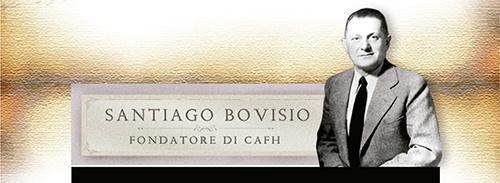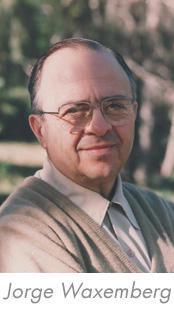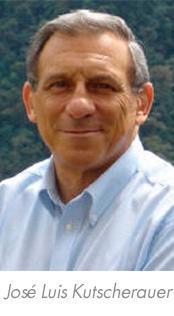The history of Cafh
We can trace Cafh’s history through the work of the three Directors Cafh has had since its foundation.
In the early years of the XX century, there were many people who sailed across the Atlantic for the first time, looking for a new life. They were leaving behind a Europe wounded by war, with the promise that in American soil they would find a place to build the future of peace they were longing for.
In 1927, Argentina received a 23-year old man arriving from Italy. The young Santiago Bovisio was bringing along a great treasure, a seed that he was to sow and take care of in his new home country. This seed contained the heritage he had received in Italy from his spiritual teachers.
Young Santiago had participated in a European spiritual society where he had received an extraordinary training, education and and knowledge, in many aspects of spiritual life.
During his first 10 years in Argentina, Don Santiago worked to spread his vision of spiritual life. He gave lectures, wrote for different publications and organized activities geared to human advancement.
By 1937, he had met some people willing to accompany him in a new undertaking, a work that he yearned to offer to society. With these people, born in the American continent, he founded Cafh.
Santiago Bovisio’s Teachings were imbued with symbolism and poetry, the characteristic language of that generous soul, who stimulated us to set about living every moment as a spiritual flight.
Click here for the link to the website of the original Teachings.
When Sr. Bovisio died in 1962, he was succeeded by Sr. Jorge Waxemberg, who ruled Cafh for 42 years.
Sr. Jorge accompanied Sr. Santiago in the development of the work of Cafh all throughout Argentina and in other countries of South America where the idea of renouncement flourished. He was elected director of Cafh in 1963, and from that time on, he gave a great impulse to the expansion of the work of Cafh all over the world, fostering its spread in more than 20 countries.
He promoted the formation of groups of Cafh in countries from Latin America, North America, Europe, the Middle East and Australia. Thanks to his outstanding analytic capacity, he introduced a clear language where the word turned into an instrument for the student’s mind to work on itself. He also updated the relation between the students and their Spiritual Director, making it clear that in Cafh every member is invited to work side by side with the director but not to follow him/her. Each individual is to discover his/her own spiritual route. He formulated the postulates and principles of Cafh, creating a clear basis to understand the fundamental ideas supporting the Teaching of Cafh. In May 2005, Sr. Waxemberg retired from his function as Cafh’s Director. He still has an active participation and is the author of Cafh Collection, his latest publication being “Words Matter” in 2015. He has given away all his copyright to Cafh Foundation in Argentina, as well as any income generated by the sale of the books.
In the 2005 Annual Assembly, Cafh’s members elected the new Spiritual Director of Cafh, Sr. Jose Luis Kutscherauer.
Sr. Jose Luis came in contact with Cafh in his early youth in his native province of Córdoba, Argentina. He became a member in 1961 and in 1973 he entered a Community of Cafh.
In 1979 he moved to Costa Rica, where he was appointed Delegate for all Communities of Cafh. Ever since their foundation, these Communities have reflected their members’ vocation of renouncement through a sustainable social work. Along the years, the economic activities developed by the Communities became a source of employment and development for the inhabitants of the regions where they were settled and a reference of solidarity at a national level. From 2005 to the present, Sr. José Luis Kutscherauer has fostered the movement of Cafh towards a key practice in our ultra-connected times: to open up and share.
This movement is reflected in the development of a culture of interdependent work, beyond the dependence - independence dichotomy. Teams were formed in all areas of interest for the development of the work of Cafh and people from different areas and countries were invited to join them.
This movement towards openness and sharing has also resulted in the offering of offices and free publication of courses and tools for spiritual unfolding, supported by the voluntary donations and work of Cafh’s members.
At present, Cafh offers weekly reunions and retreats for its members in over 200 different places. In 2015, it also organized workshops, reunions, courses and retreats to more than 3000 people, non-members who became interested in knowing about Cafh. In these workshops, participants are taught how to do inner work, so that they can expand their own conscience and contribute to the good of society through their own transformation.





